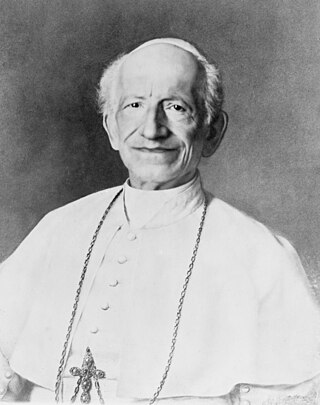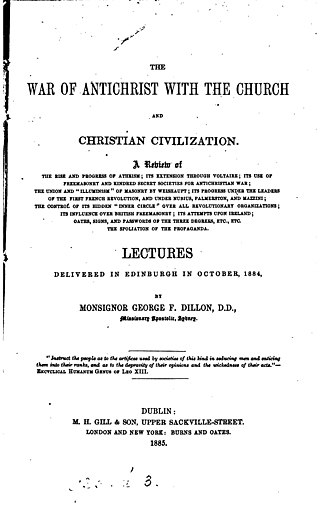| Etsi Nos Latin for 'Although we' Encyclical of Pope Leo XIII | |
|---|---|
 | |
| Signature date | 15 February 1879 |
| Subject | On conditions in Italy |
| Number | 9 of 85 of the pontificate |
| Text | |
Etsi Nos (English: On Conditions in Italy) was a papal encyclical promulgated by Pope Leo XIII in 1882 denouncing the way in which post-unification Italy denigrated the role of the Church, [1] which it blamed primarily on Freemasonry:
"It is even reported that this year it is about to receive the deputies and leaders of the sect which is most embittered against Catholicism, who have appointed this city as the place for their solemn meeting. The reasons which have determined their choice of such a meeting place are no secret; they desire by this outrageous provocation to glut the hatred which they nourish against the Church, and to bring their incendiary torches within reach of the Roman Pontificate by attacking it in its very seat." [2]
Etsi Nos was one of Leo's first encyclicals to a specific country's bishops, in this case, Italy, the newly created state which surrounded the Vatican. In Etsi Nos, Leo derided the governments that had taken over the country. After the formation of the Italian State in 1870, a series of Socialist governments governed Italy. In 1876, the election of Agostino Depretis as prime minister was the beginning of the long socialist period. Northern Italy was industrialized and richer than the southern part of Italy, which was marked by depravity. Depretis resigned in 1878 due to a scandal in his government. Leo insisted that his clergy rise above Italy's immorality:
[…] in these days there is great and far extended corruption of morals, there is need in priests of singular excellence of virtue and constancy. They can by no means avoid associating with men; by the very duties of their office, indeed, they are compelled to have intimate relations with the people; and that in the midst of cities where there is hardly any lust that has not permitted and unbridled license. From which it follows that virtue in the clergy ought at this time to be strong enough peacefully to guard itself, and both conquer all the blandishments of desire and securely overcome dangerous examples. [3]
Depretis was reelected in 1879 and, as the prime minister at the time Etsi Nos's publication, was the target of Leo's complaints. Depretis tried a method of government called "Transformismo" which ignored party labels, taking ministers from both left and right. When 500 Italian troops were killed by Ethiopians at the Battle of Dogali in January 1887, his government resigned a second time. [4]
The fear of authoritarian measures from the socialist government according to Leo, resulted in "a paucity of clerics has everywhere followed the laws which have been enacted to the injury of the Church, so plainly, that it is necessary for those who by the grace of God are being trained to Holy Orders, to give double attention, and by increased diligence, zeal, and devotion to compensate for the sparse supply". [5]






